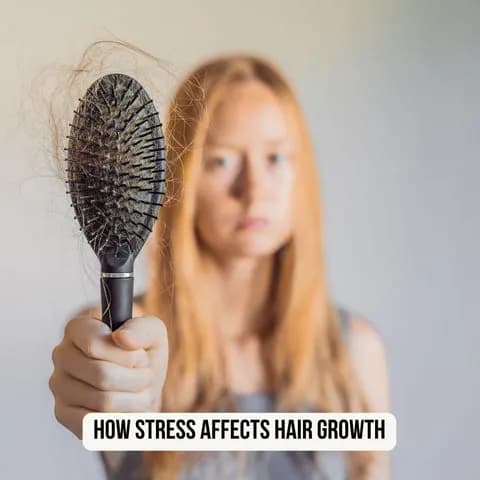
How Stress Affects Hair Health
Stress can trigger hair loss through conditions like telogen effluvium and alopecia areata. Discover how managing stress through mindfulness, sleep, diet, and exercise can promote healthier hair and overall well-being. Learn the best tips to restore your hair naturally.
Aditi S
Stressed Out? Here’s How It’s Affecting Your Hair and What to Do About It:
Stressed Out? Here’s How It’s Affecting Your Hair and What to Do About ItStress doesn’t just affect your mood or energy levels—it can also take a serious toll on your hair. Whether you're noticing more strands on your brush or even patchy hair loss, stress may be the silent culprit behind your thinning locks. Understanding the link between stress and hair health is the first step to reversing the damage and encouraging healthy regrowth.
How Stress Affects Hair Health
When your body is under stress, it releases hormones such as cortisol, which disrupt your natural hair growth cycle. This hormonal imbalance can lead to increased hair shedding, slower growth, and in severe cases, hair loss.
1. Telogen Effluvium
This is one of the most common stress-related hair issues. Stress causes hair follicles to prematurely enter the resting (telogen) phase of the hair growth cycle. After a few months, this results in noticeable shedding. While telogen effluvium is usually temporary, it can still be distressing.
2. Alopecia Areata
In more severe cases, stress can cause the immune system to attack hair follicles, resulting in patchy bald spots. This autoimmune condition, known as alopecia areata, may resolve on its own or require medical attention.
Stress Management: The Key to Healthy Hair Growth
While we can’t eliminate stress entirely, we can manage it. By adopting daily habits that reduce stress, you can significantly improve your chances of maintaining a healthy scalp and fuller hair.
1. Practice Mindfulness and Meditation
Mindfulness practices like deep breathing and meditation help reduce cortisol levels and calm the nervous system.
Tip: Try the 4-4-4 breathing method: inhale for 4 seconds, hold for 4, and exhale for 4. Just 5 minutes a day can bring noticeable results in how you feel—and how your hair looks.
2. Get Moving: Exercise for Stress Relief
Exercise increases endorphins and boosts circulation, delivering essential nutrients to your scalp.
Tip: Aim for 30 minutes of physical activity daily. Yoga, brisk walking, or even dancing can be fun and effective ways to manage stress and promote hair growth.
3. Prioritize Sleep
Sleep deprivation raises cortisol levels and impairs recovery processes, including those that affect your hair.
Tip: Create a sleep-friendly environment: avoid screens before bed, stick to a consistent sleep schedule, and wind down with relaxing activities like reading or a warm bath.
4. Nourish Your Body
A diet rich in stress-reducing nutrients supports hormone balance and fuels the hair growth cycle.
Tip: Include foods high in Vitamin B, magnesium, omega-3s, and zinc. Leafy greens, almonds, salmon, and whole grains are excellent choices. Supplements like biotin and zinc can also help, especially during high-stress periods.
Final Thoughts
Hair loss from stress can feel overwhelming, but the good news is—it’s often reversible. By integrating healthy lifestyle habits that manage stress, you not only improve your hair health but also enhance your overall well-being.
Your hair is a reflection of what’s happening inside your body. Take care of your mind and body, and your hair will thank you.

